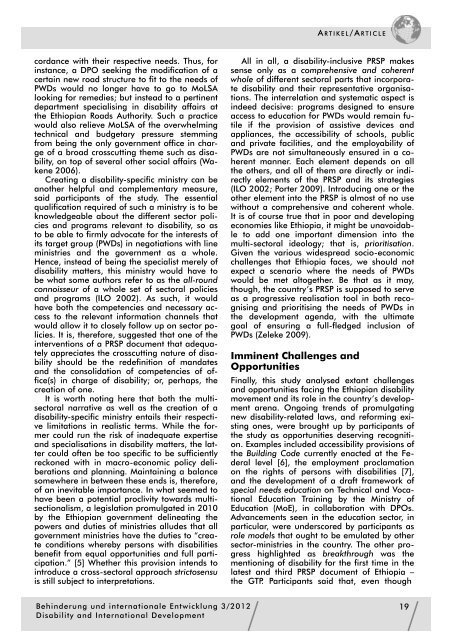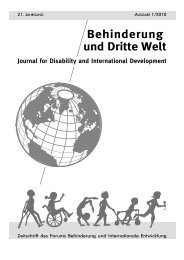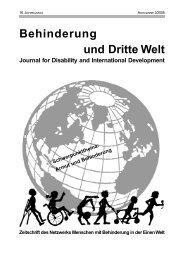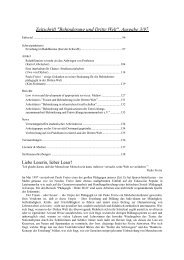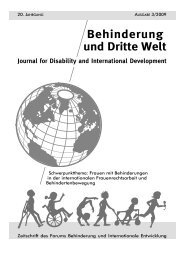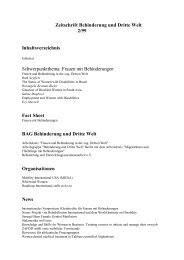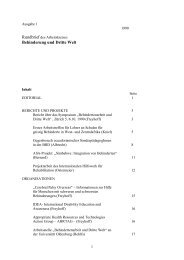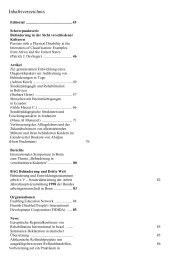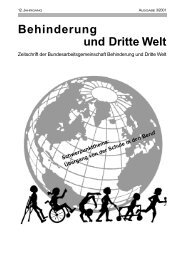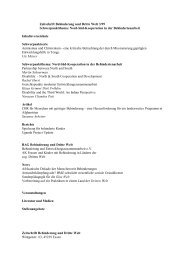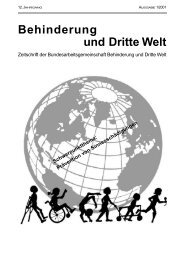Behinderung und internationale Entwicklung Disability and ...
Behinderung und internationale Entwicklung Disability and ...
Behinderung und internationale Entwicklung Disability and ...
You also want an ePaper? Increase the reach of your titles
YUMPU automatically turns print PDFs into web optimized ePapers that Google loves.
A RTIKEL/ARTICLEcordance with their respective needs. Thus, forinstance, a DPO seeking the modification of acertain new road structure to fit to the needs ofPWDs would no longer have to go to MoLSAlooking for remedies; but instead to a pertinentdepartment specialising in disability affairs atthe Ethiopian Roads Authority. Such a practicewould also relieve MoLSA of the overwhelmingtechnical <strong>and</strong> budgetary pressure stemmingfrom being the only government office in chargeof a broad crosscutting theme such as disability,on top of several other social affairs (Wakene2006).Creating a disability-specific ministry can beanother helpful <strong>and</strong> complementary measure,said participants of the study. The essentialqualification required of such a ministry is to beknowledgeable about the different sector policies<strong>and</strong> programs relevant to disability, so asto be able to firmly advocate for the interests ofits target group (PWDs) in negotiations with lineministries <strong>and</strong> the government as a whole.Hence, instead of being the specialist merely ofdisability matters, this ministry would have tobe what some authors refer to as the all-ro<strong>und</strong>connoisseur of a whole set of sectoral policies<strong>and</strong> programs (ILO 2002). As such, it wouldhave both the competencies <strong>and</strong> necessary accessto the relevant information channels thatwould allow it to closely follow up on sector policies.It is, therefore, suggested that one of theinterventions of a PRSP document that adequatelyappreciates the crosscutting nature of disabilityshould be the redefinition of m<strong>and</strong>ates<strong>and</strong> the consolidation of competencies of office(s)in charge of disability; or, perhaps, thecreation of one.It is worth noting here that both the multisectoralnarrative as well as the creation of adisability-specific ministry entails their respectivelimitations in realistic terms. While the formercould run the risk of inadequate expertise<strong>and</strong> specialisations in disability matters, the lattercould often be too specific to be sufficientlyreckoned with in macro-economic policy deliberations<strong>and</strong> planning. Maintaining a balancesomewhere in between these ends is, therefore,of an inevitable importance. In what seemed tohave been a potential proclivity towards multisectionalism,a legislation promulgated in 2010by the Ethiopian government delineating thepowers <strong>and</strong> duties of ministries alludes that allgovernment ministries have the duties to “createconditions whereby persons with disabilitiesbenefit from equal opportunities <strong>and</strong> full participation.”[5] Whether this provision intends tointroduce a cross-sectoral approach strictosensuis still subject to interpretations.All in all, a disability-inclusive PRSP makessense only as a comprehensive <strong>and</strong> coherentwhole of different sectoral parts that incorporatedisability <strong>and</strong> their representative organisations.The interrelation <strong>and</strong> systematic aspect isindeed decisive: programs designed to ensureaccess to education for PWDs would remain futileif the provision of assistive devices <strong>and</strong>appliances, the accessibility of schools, public<strong>and</strong> private facilities, <strong>and</strong> the employability ofPWDs are not simultaneously ensured in a coherentmanner. Each element depends on allthe others, <strong>and</strong> all of them are directly or indirectlyelements of the PRSP <strong>and</strong> its strategies(ILO 2002; Porter 2009). Introducing one or theother element into the PRSP is almost of no usewithout a comprehensive <strong>and</strong> coherent whole.It is of course true that in poor <strong>and</strong> developingeconomies like Ethiopia, it might be unavoidableto add one important dimension into themulti-sectoral ideology; that is, prioritisation.Given the various widespread socio-economicchallenges that Ethiopia faces, we should notexpect a scenario where the needs of PWDswould be met altogether. Be that as it may,though, the country’s PRSP is supposed to serveas a progressive realisation tool in both recognising<strong>and</strong> prioritising the needs of PWDs inthe development agenda, with the ultimategoal of ensuring a full-fledged inclusion ofPWDs (Zeleke 2009).Imminent Challenges <strong>and</strong>OpportunitiesFinally, this study analysed extant challenges<strong>and</strong> opportunities facing the Ethiopian disabilitymovement <strong>and</strong> its role in the country’s developmentarena. Ongoing trends of promulgatingnew disability-related laws, <strong>and</strong> reforming existingones, were brought up by participants ofthe study as opportunities deserving recognition.Examples included accessibility provisions ofthe Building Code currently enacted at the Federallevel [6], the employment proclamationon the rights of persons with disabilities [7],<strong>and</strong> the development of a draft framework ofspecial needs education on Technical <strong>and</strong> VocationalEducation Training by the Ministry ofEducation (MoE), in collaboration with DPOs.Advancements seen in the education sector, inparticular, were <strong>und</strong>erscored by participants asrole models that ought to be emulated by othersector-ministries in the country. The other progresshighlighted as breakthrough was thementioning of disability for the first time in thelatest <strong>and</strong> third PRSP document of Ethiopia –the GTP. Participants said that, even though<strong>Behinderung</strong> <strong>und</strong> <strong>internationale</strong> <strong>Entwicklung</strong> 3/2012<strong>Disability</strong> <strong>and</strong> International Development19


